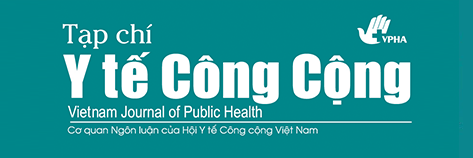Thực trạng chơi game trực tuyến (game online) của học sinh tại 3 trường trung học cơ sở ở Hà Nội năm 2009 (Gameonline situational assessment among secondary school students in Ha Noi, 2009)
Tóm tắt
GameOnline (GO) là loại hình giải trí khá phổ biến của giới trẻ nhưng có nhiều tác động tiêu cực tới đời sống xã hội. Bài báo trình bày kết quả nghiên cứu về hiểu biết, thái độ, và hành vi chơi GO của HS 03 trường trung học cơ sở tại Hà Nội. Thiết kế mô tả cắt ngang sử dụng bộ câu hỏi tự điền, mẫu nghiên cứu gồm 980 HS khối 7, 8 và 9 (47,4% nam). Kết quả: 69,5% HS đạt hiểu biết chung về GO gồm giờ chơi/ngày, ảnh hưởng tích cực khi chơi hợp lý; ảnh hưởng khi chơi quá mức và các quy định khi chơi. Đa số HS chơi để giải trí, hoặc do GO hấp dẫn, để kết bạn, hoặc để có những cảm giác không có trong đời thực, hoặc để kiếm tiền. 81,5% HS đã từng chơi GO, trong đó có 23,2% chơi quá mức. Địa điểm chơi chủ yếu là ở nhà (70,3%) vào buổi tối hoặc khuya. Có 64% HS chưa nhận được lời khuyên ngừng chơi GO, nhưng 82% HS cho biết sẽ tham gia hoạt động ngoại khóa thay vì chơi GO hay 69,4% sẽ cố gắng tiếp thu khi nhận được lời khuyên về chơi GO. Rõ ràng, tỷ lệ chơi GO ở học sinh là khá cao và cần thiết phải tìm hiểu các yếu tố dẫn đến hành vi chơi GO của HS và các biện pháp làm giảm những tác động không mong muốn của GO.
English abstract
Background: Gameonline (GO) is a popular kind of entertainment for adolescents but it also brings negative impacts to social life. This study is aimed to characterize knowledge, attitudes and behavior of GO players who are students of three secondary schools in Ha Noi. Design: A cross-sectional descriptive study of 980 students at the 7th, 8th and 9th grade (47.4% of male students aged 12 -14 years) with a self-administered questionnaire. Findings: 69.5% of students had general knowledge of GO, including playing duration/day, pros and cons, and rules for GO players. Most of students played GO for relaxation, making more friends, having virtual feelings, or making money… 81.5% of students have ever played GO, of whom 23,2% were found to have over-playing. GO was mainly played at home, in the evening or late at night. While 64% of students did not receive any advice of stopping GO from family members or friends, 82% of students thought of joining extra-curricular activities (if any) instead of GO and 69.4% of students showed their intention of changing behavior on GO upon receiving relevant advice. Conclusion: Prevalence of GO playing is quite high among secondary school students. It is important to identify factors related to their GO playing behavior and develop practical solutions for limiting disadvantages of GO.
Từ khóa
Toàn văn:
PDF (English)##submission.citations##
Tài liệu tiếng Việt
Bộ Bưu chính viễn thông, Trung tâm Internet Việt Nam (2010). Thông báo số liệu phát triển Internet Việt Nam, [Trích dẫn ngày 26/05/2010]. Lấy từ: http://www.thongkeinternet.vn/jsp/trangchu/index.jsp
Bộ Công Thương (2007), Báo cáo thương mại điện tử Việt Nam 2006. [trích dẫn ngày 08/08/2009]; 30-78, Lấy từ: http://www.moit.gov.vn
Bộ Y tế, Tổng cục thống kê, Tổ chức Y tế thế giới, Quỹ Nhi đồng Liên Hợp Quốc (2003). "Điều tra Quốc gia về VTN và Thanh niên (SAVY)". [Trích dẫn ngày 16/08/2009], lấy từ: http://www.unicef.org/vietnam/vi/media_2390.html
Nguyễn Thị Phương Thảo (2007), Tác động của GameOnline đối với việc học tập và nâng cao kiến thức của học sinh đô thị hiện nay (Nghiên cứu trường hợp tại Ninh Bình), Luận án thạc sỹ Trường Đại học KHXH&NV.
Sở giáo dục và đào tạo Hà nội (2007), Công văn số 2696/UBND-KT về việc Quản lý, giáo dục học sinh về Internet, GameOnline trong trường học,[trích dẫn ngày 14/07/2009] lấy từ: http://www.hanoi.edu.vn/.
Tài liệu tiếng Anh
Ahn DH (2007), Korean policy on treatment and rehabilitation for adolescents' Internet addiction, International Symposium on the Counseling and Treatment of Youth Internet Addiction, National Youth Commission, Seoul, Korea, p 49.
Brenner, V. (1996), An initial report on the online assessment of Internet addiction: The first 30 days of the Internet usage survey, [cited 2009 May 29]; Avaiable from: URL:http://www.ccsnet.com/prep/pap/pap8b/638b/012p.tx.
Chin-Sheng, W. & Chiou, W.B. (2006), Why Are Adolescents Addicted to Online Gaming? An Interview Study in Taiwan, Taiwan, 762 - 766.
Choi, D., & Kim, J. (2004), Why people continue to play online games: In search of critical design factors to increase customers loyalty to online contents, CyberPsychology & Behavior, 7, 11-24.
Choi Y.H. (2007), Advancement of IT and seriousness of youth Internet addiction, 2007 International Symposium on the Counseling and Treatment of Youth Internet Addiction, National Youth Commission 2007, Seoul, Korea, p 20.
Goldberg I. (1995), Internet addiction disorder [Cited 2009 Jul 22]; Available from: URL: http://web.urz.uniheidelberg.de/Netzdienste/anleitung/ww wtips/8/addict.html.
Griffiths, M.D., Davies, M.N., & Chappell D. (2003b), Online computer gaming: a comparison of adolescent and adult gamers, Journal of Adolescence, 27:87-96.
Kim, K.H., Park, J.Y., Kim, D.Y., Moon, H.I., & Chun, H.C. (2002), "E-lifestyle and motives to use online games", Irish Marketing Review, 15:71-77.
Michael et al (2008), Demographics, Motivations, Addictions and Usage Patterns among Chinese College Student MMORPG Players, Graduation Project Presented to the Faculty of Graduate School of The Chinese University of Hong Kong in Partial Fulfillment of Requirements for the Degree of Master of Science in New Media.
People's Daily Online (2007), The more they play, the more they lose, [Cited 2009 Api 21]; Available from: URL:http://www.chinadaily.com.cn/china/2007-04/10/content_846715.htm.
Wen-Bin Chiou and Chin-Sheng Wan (2006), A Further Investigation on the Motives of Online Games Addiction, Taiwan, General Education Center, National Kaohsiung Hospitality College, [Cited 2009 Jul 27]; Available from: URL: http://www.iste.org/Content/NavigationMenu/Research/NECC_Research_Paper_Archives/NECC_2006/Chiou_Wen_Bin_NECC06.pdf.
Young K. (2009), You are an obsessive online Gamer, Center for Internet Addiction Recovery [Cited 2009 Aug 15]; Available from: URL:, http://www.netaddiction.com/index.php?option=com_content&view=article&id=80%3Agamer&catid=42%3Arecov ery-resources&Itemid=84.



